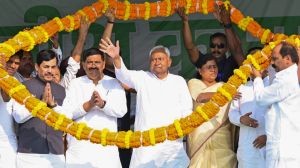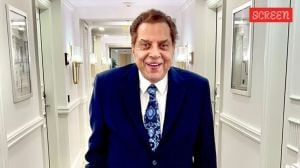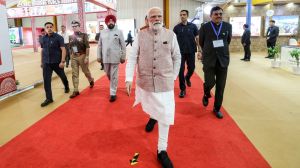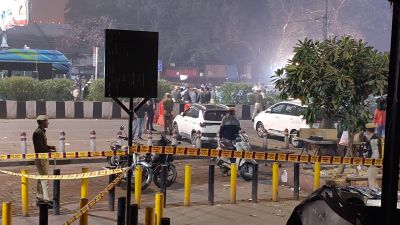Bankim Chandra Chattopadhyay’s Vande Mataram was composed in 1875 and published as part of his novel Anandamath in 1882. In October 1937, the Congress decided to adopt only the first two stanzas of the song.

Speaking in the Capital at an event to kick off the year-long commemoration of Vande Mataram, marking its 150 years, Modi said, “Azadi ki ladai mei Vande Mataram ki bhavna ne poore rashtra ko prakashit kiya thha. Lekin durbhagya se, 1937 mei, Vande Mataram ke mahatvapoorn padon ko, uski aatma ke ek hisse ko alag kar diya gaya thha. Vande Mataram ko tod diya gaya thha, uske tukde kiye gaye thhe. Vande Mataram ke iss vibhajan ne desh ke vibhajan ke beej bhi bo diye thhe… wahi vibhajakari soch desh ke liye aaj bhi chunauti bani hui hai,” he said.
Story continues below this ad
(“The spirit of Vande Mataram illuminated the entire nation during the freedom struggle. But unfortunately, in 1937, important stanzas of Vande Mataram, a part of its soul, were severed. Vande Mataram was broken, it was torn into pieces. This division of Vande Mataram also sowed the seeds of division of the country… that same divisive mindset remains a challenge for the country even today.”)
Watch here:
Noting that Vande Mataram is relevant in every era, the Prime Minister, in an apparent reference to Operation Sindoor, said, “When the enemy dared to attack our security and honour using terrorism, the world saw that India knows how to take the form of Durga.”
“Just a few centuries ago, India accounted for nearly one-fourth of the global GDP. When Bankim Babu composed Vande Mataram, India had drifted far from that golden era. Foreign invasions, plunder, and exploitative colonial policies had left the country suffering with poverty and hunger,” he said.
“Yet, Bankim Babu invoked the vision of a prosperous India, driven by his belief that no matter how great the challenges, India could revive its golden age. And thus, he gave the clarion call: Vande Mataram,” he said.
Modi said that during the colonial era, the British sought to justify their rule by portraying India as inferior and backward. The very first line of Vande Mataram, he said, dismantled this false propaganda.
Noting that in recent years, the world has witnessed the emergence of India in its true form, he highlighted progress in the fields of science and technology and its rise as the fifth-largest economy in the world.
Story continues below this ad
Organised by the Ministry of Culture, the programme marked the formal launch of the year-long nationwide commemoration – November 7, 2025 to November 7, 2026 – celebrating 150 years of Vande Mataram.
Union Minister Gajendra Singh Shekhawat, Delhi Lieutenant Governor Vinai Kumar Saxena, Delhi Chief Minister Rekha Gupta were among those present at the event. A special commemorative coin and postage stamp dedicated to Vande Mataram were released.
Earlier in the day, the BJP accused the Congress of “brazenly pandering to its communal agenda under the presidentship of Jawaharlal Nehru” by adopting only a truncated Vande Mataram in 1937.
“The Congress committed the historic sin and blunder of linking the song with religion. Congress under Nehru citing religious grounds deliberately removed stanzas of Vande Mataram which hailed Goddess Maa Durga,” BJP spokesperson C R Kesavan said in a post on X.
Sharing his message on the 150th anniversary of the national song, Congress president Mallikarjun Kharge said, “The Indian National Congress has been the proud flagbearer of Vande Mataram. It was during the 1896 session of the Congress in Calcutta, under the leadership of the then Congress president, Rahmatullah Sayani, that Vande Mataram was sung publicly for the first time by Gurudev Rabindranath Tagore.”
“It is deeply ironic that those who today claim to be the self-proclaimed guardians of nationalism, the RSS and the BJP, have never sung Vande Mataram or our national anthem Jana Gana Mana in their shakhas or offices,” he said.









